
International Review of Pragmatics
Scope & Guideline
Unraveling the Complexities of Language and Interaction
Introduction
Aims and Scopes
- Pragmatic Theory Development:
The journal publishes research that contributes to the theoretical frameworks of pragmatics, including the study of speech acts, implicature, and discourse analysis. - Contextual Language Use:
Research often emphasizes the importance of context in language use, examining how situational factors influence meaning and communication strategies. - Multimodal Communication:
The journal explores how various communicative modalities (e.g., verbal, non-verbal, digital) interact to create meaning, particularly in contemporary settings such as social media. - Intercultural Pragmatics:
A significant focus is placed on the pragmatics of communication across cultures, addressing how cultural differences affect language use and understanding. - Pragmatics in Educational Settings:
The journal also covers the application of pragmatic principles in educational contexts, including language learning and teaching, and the development of pragmatic competence.
Trending and Emerging
- Digital Communication and Social Media:
Recent publications increasingly examine the pragmatics of digital communication, particularly in social media contexts, showcasing the evolving nature of language in online interactions. - Pragmatic Competence and Language Learning:
There is a growing interest in the development of pragmatic competence among language learners, emphasizing the importance of teaching pragmatics within language education. - Interdisciplinary Approaches to Pragmatics:
An emerging trend involves interdisciplinary research that combines insights from fields such as psychology, sociology, and cultural studies to enrich pragmatic analysis. - Crisis Communication and Discourse Analysis:
The journal has seen a rise in papers addressing crisis communication, particularly in relation to global events such as the COVID-19 pandemic, reflecting the relevance of pragmatics in understanding public discourse. - Political and Institutional Discourse:
Increasing attention is being paid to the pragmatics of political and institutional communication, highlighting how language functions in power dynamics and social structures.
Declining or Waning
- Traditional Linguistic Analysis:
There seems to be a decrease in papers that focus solely on traditional linguistic analysis without considering pragmatic implications, suggesting a shift towards more context-sensitive approaches. - Static Models of Communication:
Research employing rigid, static models of communication is less frequent, indicating a trend towards dynamic, contextually responsive models that better capture the complexities of real-world interactions. - Narrowly Defined Pragmatic Phenomena:
Studies concentrating on very specific or narrowly defined pragmatic phenomena, such as isolated speech acts, are becoming less common, possibly as researchers seek to explore broader, more integrative frameworks.
Similar Journals
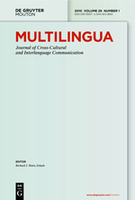
Multilingua-Journal of Cross-Cultural and Interlanguage Communication
Exploring the Rich Tapestry of Multilingual CommunicationMultilingua: Journal of Cross-Cultural and Interlanguage Communication is a premier academic journal published by DE GRUYTER MOUTON, specializing in the dynamic fields of communication and linguistics. Established in 1982, this journal has significantly contributed to the discourse surrounding multilingualism, intercultural interactions, and language acquisition, with a notable reputation backed by an impressive Q1 ranking in both Communication and Linguistics and Language for 2023. Positioned strategically at the heart of Germany, the journal serves as a vital platform for researchers, professionals, and students alike, fostering scholarly exchange and insights into cross-cultural communication practices. With rankings placing it in the top percentiles across key categories in Scopus, including Arts and Humanities and Social Sciences, Multilingua exemplifies the highest standards of academic excellence. Although currently not an Open Access journal, it continues to provide a wealth of knowledge to the global research community.
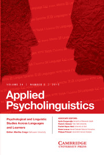
APPLIED PSYCHOLINGUISTICS
Unveiling the Cognitive Mechanisms of CommunicationApplied Psycholinguistics, published by Cambridge University Press, is a premier journal in the fields of linguistics, psychology, and cognitive science, with a focus on the intersection of language and psychological processes. Since its inception in 1980, the journal has consistently provided a platform for high-quality research, achieving impressive rankings in various categories as of 2023, including Q1 status in Linguistics and Language, and Q1 in Psychology (miscellaneous). With a focus on experimental and cognitive psychology, it fosters the exploration of language acquisition, social communication, and cognitive mechanisms underlying language use. Although it is not available as an Open Access journal, its rigorous peer-review process and impactful articles make it a significant resource for researchers, professionals, and students alike. The journal's commitment to advancing knowledge is evident through its contributions to both theoretical and applied psycholinguistic research. Whether you're a seasoned researcher or a student eager to delve into psycholinguistics, this journal serves as an essential resource for keeping abreast of cutting-edge developments in the discipline.
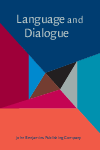
Language and Dialogue
Pioneering Research at the Crossroads of Dialogue and LanguageLanguage and Dialogue is an esteemed journal published by JOHN BENJAMINS PUBLISHING CO, focusing on the interdisciplinary intersections of language use, cultural studies, and literary theory. With an ISSN of 2210-4119 and an E-ISSN of 2210-4127, the journal has established itself as a prominent platform for high-quality research since its inception in 2011. Notably, it is ranked Q1 in Cultural Studies and Literature and Literary Theory, reflecting its prestigious standing in these fields, and has impressive Scopus rankings that further underline its scholarly impact within the arts and humanities. Based in the Netherlands, Language and Dialogue is committed to advancing the understanding of dialogue's role in language and communication, providing a vital resource for researchers, professionals, and students alike. Although not an Open Access journal, it ensures access to cutting-edge research through institutional subscriptions, making it an essential addition to any academic collection in the humanities and social sciences.

Journal of Greek Linguistics
Illuminating the Evolution of Greek LinguisticsThe Journal of Greek Linguistics, published by BRILL, is a premier platform dedicated to advancing the study of Greek language and its historical and contemporary implications within the broader field of linguistics. With an impact factor recognized in the linguistics community, this journal significantly contributes to the academic discourse surrounding Greek linguistics and its relevance in cultural and social studies. First made open access in 2016, it is now accessible to a global audience, facilitating a collaborative environment for researchers, scholars, professionals, and students alike. The journal is proudly positioned in the Q2 quartile for linguistics and language, reflecting its esteemed standing in the academic community, and it ranks within the top 30% in both the Arts and Humanities and Social Sciences categories according to Scopus. With a focus on the intersection of language, culture, and society, the journal invites contributions that offer new insights and promote interdisciplinary research. The Journal of Greek Linguistics continues to be an essential resource for those engaged in the rich and evolving conversation about the Greek language.
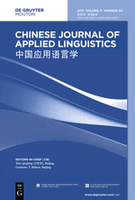
Chinese Journal of Applied Linguistics
Exploring innovative pathways in language research.The Chinese Journal of Applied Linguistics, published by the esteemed FOREIGN LANGUAGE TEACHING & RESEARCH PRESS, serves as a premier platform for scholars and practitioners in the field of linguistics, specifically focusing on the application of linguistic research in real-world contexts. With an ISSN of 2192-9505 and an E-ISSN of 2192-9513, this journal is distinguished by its position in the Q1 category for Linguistics and Language as of 2023, underscoring its influence and prestige within the academic community. Notably, it ranks 248th out of 1,088 in the Arts and Humanities field and 292nd out of 1,167 in Social Sciences, reflecting a strong percentile rank of 77th and 74th respectively. This journal aims to contribute to the advancement of applied linguistics through innovative research articles, comprehensive reviews, and critical discussions on contemporary issues in language learning and teaching, thereby attracting a diverse readership of researchers, educators, and students who are keen on exploring new linguistic paradigms. With its scope spanning from 2017 to 2024, the Chinese Journal of Applied Linguistics is committed to disseminating cutting-edge insights and fostering dialogues that propel the discipline forward, making it an essential resource for anyone engaged in the study of language and its applications.

Cultura Lenguaje y Representacion-Revista de Estudios Culturales de la Universitat Jaume I
Navigating the Complexities of Culture and DiscourseCultura Lenguaje y Representacion - Revista de Estudios Culturales de la Universitat Jaume I is a premier open-access journal dedicated to the exploration of cultural studies, linguistic discourse, and literary theory, published by the esteemed Universitat Jaume I. Since its inception in 2004, the journal has consistently aimed to provide a vibrant platform for interdisciplinary research and critical reflection within the fields of communication, literature, and cultural representation. With its impressive rankings in the Scopus database—placing in the 93rd percentile for Literature and Literary Theory and the 73rd percentile for Cultural Studies—this journal is recognized for its impactful contributions to academic discussions. Operated out of Castelló de la Plana, Spain, the publication not only welcomes contributions from seasoned scholars but also encourages emerging researchers to submit innovative works. By maintaining a dedication to accessibility and quality, Cultura Lenguaje y Representacion positions itself as an essential resource for scholars, practitioners, and students seeking to deepen their understanding of the intricate relationship between culture, language, and representation.

Fluminensia
Advancing Knowledge Through Open Access ScholarshipFluminensia, published by the University of Rijeka, Faculty of Philosophy, is a distinguished open-access journal that has been contributing to the fields of Linguistics and Literature since its inception in 1999. With an ISSN of 0353-4642 and an E-ISSN of 1848-9680, this journal offers rigorous peer-reviewed articles, fostering an engaging platform for researchers, professionals, and students alike. Recognized internationally, it holds a Q3 ranking in Linguistics and Language and a Q2 ranking in Literature and Literary Theory for 2023, reflecting its significant impact within these fields. Based in Croatia and serving a global academic community, Fluminensia aims to explore innovative theories and methodologies, promoting critical discourse and scholarly exchange. Researchers will find its broad scope inviting, bridging insights across various disciplines in the arts and humanities. Accessible to all, this journal continues to foster an inclusive academic landscape, ensuring that valuable research is widely disseminated and freely available.
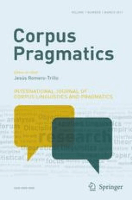
Corpus Pragmatics
Empowering Research Through Language and Computational SynergyCorpus Pragmatics is an esteemed academic journal published by SpringerNature, focusing on the interdisciplinary field of linguistics and its applications within the realms of computer science and social sciences. With a strong foundation since its inception in 2017, the journal has made significant strides, earning recognition with a Q2 rating in Linguistics and Language and a Q3 in Computer Science Applications as of 2023. The journal's impressive Scopus rankings highlight its impact, placing it in the 86th percentile among language and linguistics journals. Corpus Pragmatics aims to bridge the gap between empirical research and theoretical insights, fostering an environment that promotes innovative approaches to understanding the complexities of language use in a digital age. As an open-access platform, it provides researchers, professionals, and students with invaluable resources to enhance their work and engage with the latest findings in the field. With a commitment to quality and relevance, Corpus Pragmatics stands out as a vital resource for advancing knowledge in linguistics and its computational applications, making significant contributions to both academia and industry.
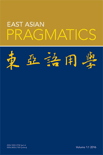
East Asian Pragmatics
Empowering Research in Communication and CultureEast Asian Pragmatics, published by EQUINOX PUBLISHING LTD, serves as a critical platform for interdisciplinary research in the fields of Communication, Cultural Studies, and Linguistics. With an ISSN of 2055-7752 and an E-ISSN of 2055-7760, this journal has established significant relevance, evidenced by its Q2 and Q3 classifications in critical academic categories for 2023. Spanning the years from 2018 to 2024, East Asian Pragmatics aims to advance understanding of pragmatics within the context of East Asia, facilitating scholarly discourse that bridges linguistic insights with cultural phenomena. Its Scopus ranking highlights its growing importance, particularly in cultural studies and linguistics where it ranks in the top half of its categories. Researchers, professionals, and students are encouraged to explore the wealth of knowledge and unique perspectives presented in its articles, contributing to the vibrant tapestry of East Asian linguistic and cultural studies.
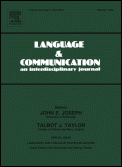
LANGUAGE & COMMUNICATION
Fostering dialogue through rigorous research and practical applications.LANGUAGE & COMMUNICATION is a prestigious journal published by PERGAMON-ELSEVIER SCIENCE LTD that serves as an essential resource for researchers and practitioners in the fields of communication, linguistics, and psychology. With a focus on interdisciplinary approaches, this journal has maintained a strong impact, as evidenced by its high rankings—Q1 status in communication and linguistics, and notable categories in experimental and cognitive psychology, as highlighted by the 2023 Scopus rankings. Established in 1981, LANGUAGE & COMMUNICATION combines rigorous empirical research with practical applications, making it a critical forum for advancing understanding in language use and communication theory. While currently not an Open Access journal, it offers vital insights to academics and professionals alike, facilitating knowledge dissemination and sparking meaningful dialogue within the community. Its commitment to excellence is further demonstrated by its contributions to key areas of study, positioning it as a vital publication for anyone invested in the exploration of language and human interaction.